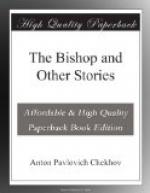Apart from the two persons described above and the coachman Deniska, who lashed the pair of frisky bay horses, there was another figure in the chaise—a boy of nine with a sunburnt face, wet with tears. This was Yegorushka, Kuzmitchov’s nephew. With the sanction of his uncle and the blessing of Father Christopher, he was now on his way to go to school. His mother, Olga Ivanovna, the widow of a collegiate secretary, and Kuzmitchov’s sister, who was fond of educated people and refined society, had entreated her brother to take Yegorushka with him when he went to sell wool and to put him to school; and now the boy was sitting on the box beside the coachman Deniska, holding on to his elbow to keep from falling off, and dancing up and down like a kettle on the hob, with no notion where he was going or what he was going for. The rapid motion through the air blew out his red shirt like a balloon on his back and made his new hat with a peacock’s feather in it, like a coachman’s, keep slipping on to the back of his head. He felt himself an intensely unfortunate person, and had an inclination to cry.
When the chaise drove past the prison, Yegorushka glanced at the sentinels pacing slowly by the high white walls, at the little barred windows, at the cross shining on the roof, and remembered how the week before, on the day of the Holy Mother of Kazan, he had been with his mother to the prison church for the Dedication Feast, and how before that, at Easter, he had gone to the prison with Deniska and Ludmila the cook, and had taken the prisoners Easter bread, eggs, cakes and roast beef. The prisoners had thanked them and made the sign of the cross, and one of them had given Yegorushka a pewter buckle of his own making.
The boy gazed at the familiar places, while the hateful chaise flew by and left them all behind. After the prison he caught glimpses of black grimy foundries, followed by the snug green cemetery surrounded by a wall of cobblestones; white crosses and tombstones, nestling among green cherry-trees and looking in the distance like patches of white, peeped out gaily from behind the wall. Yegorushka remembered that when the cherries were in blossom those white patches melted with the flowers into a sea of white; and that when the cherries were ripe the white tombstones and crosses were dotted with splashes of red like bloodstains. Under the cherry trees in the cemetery Yegorushka’s father and granny, Zinaida Danilovna, lay sleeping day and night. When Granny had died she had been put in a long narrow coffin and two pennies had been put upon her eyes, which would not keep shut. Up to the time of her death she had been brisk, and used to bring soft rolls covered with poppy seeds from the market. Now she did nothing but sleep and sleep. . . .
Beyond the cemetery came the smoking brickyards. From under the long roofs of reeds that looked as though pressed flat to the ground, a thick black smoke rose in great clouds and floated lazily upwards. The sky was murky above the brickyards and the cemetery, and great shadows from the clouds of smoke crept over the fields and across the roads. Men and horses covered with red dust were moving about in the smoke near the roofs.




